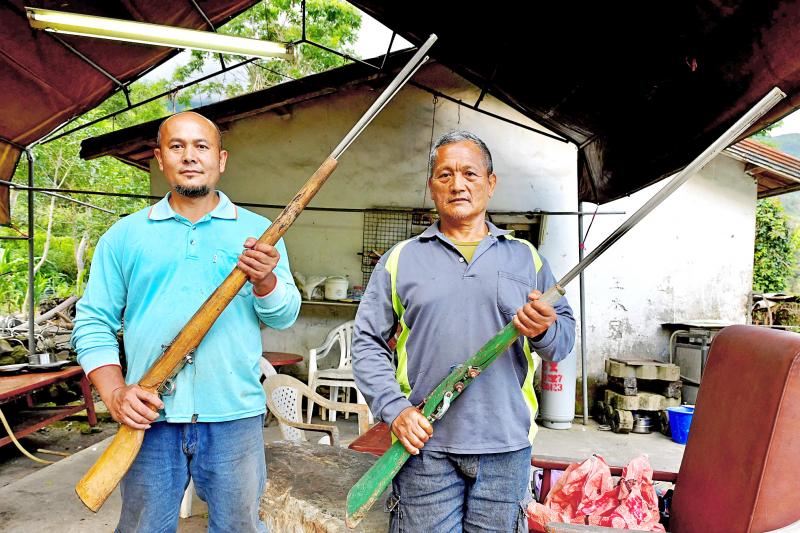President Tsai Ing-wen (蔡英文) yesterday pardoned a Bunun hunter charged in 2013 with killing protected animals, on the first anniversary of her second presidential term.
The pardon of Tama Talum, convicted in 2015 for killing a Reeves’ muntjac and a Formosan serow with a modified shotgun, is the first pardon of Tsai’s two terms since 2016 and the seventh since the enactment of the Constitution on Dec. 25, 1947.
Talum was sentenced to three-and-a-half years in prison for possessing an illegal weapon and hunting protected species. He appealed, and in 2017, the Supreme Court suspended the hearing, but asked the Council of Grand Justices to review hunting regulations under the Controlling Guns, Ammunition and Knives Act (槍砲彈藥刀械管制條例) and the Wildlife Conservation Act (野生動物保育法).

Photo: Sam Yeh, AFP
The Council of Grand Justices on May 7 ruled in Constitutional Interpretation No. 803 that some restrictions on Aborigines were unconstitutional, but stopped short of supporting a total overhaul of the regulations.
The Supreme Court yesterday said that although Talum was pardoned from serving his sentence, it would need to follow procedure until the case is closed, as verdicts from the lower appellate courts still stand.
Presidential Office spokesperson Kolas Yotaka, an Amis, said the decision carried significant weight, especially amid the government’s efforts to promote historical and transitional justice for Aborigines.
The Constitution clearly supports the values of a multiethnic and multicultural society, guaranteeing Aborigines the right to express their culture in the form of hunting, she said.
“The people share their living space with nature. It is part of Aboriginal culture. They live together, they live off each other,” Kolas said, adding that hunting is a natural part of the lives of Aborigines.
Although Talum had contravened certain laws, his actions were within the defined parameters of Aboriginal culture, as stated in Constitutional Interpretation No. 803, and he should be pardoned to show that the government respects Aboriginal culture, she said.
Talum said that he had not yet heard the news of the pardon from his lawyer, adding that he would be happy if it is true.
He said he would not go out of his way to mention it to his 99-year-old mother, for whom he had said he hunted the birds in 2013, given her advanced age and poor memory.
Another hunter Pan Chih-chiang (潘志強), a Puyuma who was sentenced on similar charges and among those petitioning for a constitutional interpretation on hunting, said he was happy to hear of Tsai’s decision, adding that the pardon would help dissolve ethnic tension and confrontation.
Pan in 2014 was sentenced to six months in prison, or a fine of NT$180,000, for killing two Reeves’ muntjacs. He chose to pay the fine.
The Environment and Animal Society of Taiwan said that the pardon was mostly issued due to Talum’s aging mother, adding that Aboriginal communities must step up self-policing of hunting.
There are more than 700 Aboriginal communities nationwide, and if wildlife hunting is not monitored and regulated with a total cap, more wild animals would need legal protection due to overhunting, the society said.

The Central Election Commission has amended election and recall regulations to require elected office candidates to provide proof that they have no Chinese citizenship, a Cabinet report said. The commission on Oct. 29 last year revised the Measures for the Permission of Family-based Residence, Long-term Residence and Settlement of People from the Mainland Area in the Taiwan Area (大陸地區人民在台灣地區依親居留長期居留或定居許可辦法), the Executive Yuan said in a report it submitted to the legislature for review. The revision requires Chinese citizens applying for permanent residency to submit notarial documents showing that they have lost their Chinese household record and have renounced — or have never

A magnitude 5.6 earthquake struck off the coast of Yilan County at 12:37pm today, with clear shaking felt across much of northern Taiwan. There were no immediate reports of damage. The epicenter of the quake was 16.9km east-southeast of Yilan County Hall offshore at a depth of 66.8km, Central Weather Administration (CWA) data showed. The maximum intensity registered at a 4 in Yilan County’s Nanao Township (南澳) on Taiwan’s seven-tier scale. Other parts of Yilan, as well as certain areas of Hualien County, Taipei, New Taipei City, Taoyuan, Hsinchu County, Taichung and Miaoli County, recorded intensities of 3. Residents of Yilan County and Taipei received

Taiwan has secured another breakthrough in fruit exports, with jujubes, dragon fruit and lychees approved for shipment to the EU, the Ministry of Agriculture said yesterday. The Animal and Plant Health Inspection Agency on Thursday received formal notification of the approval from the EU, the ministry said, adding that the decision was expected to expand Taiwanese fruit producers’ access to high-end European markets. Taiwan exported 126 tonnes of lychees last year, valued at US$1.48 million, with Japan accounting for 102 tonnes. Other export destinations included New Zealand, Hong Kong, the US and Australia, ministry data showed. Jujube exports totaled 103 tonnes, valued at

BIG SPENDERS: Foreign investors bought the most Taiwan equities since 2005, signaling confidence that an AI boom would continue to benefit chipmakers Taiwan Semiconductor Manufacturing Co’s (TSMC, 台積電) market capitalization swelled to US$2 trillion for the first time following a 4.25 percent rally in its American depositary receipts (ADR) overnight, putting the world’s biggest contract chipmaker sixth on the list of the world’s biggest companies by market capitalization, just behind Amazon.com Inc. The site CompaniesMarketcap.com ranked TSMC ahead of Saudi Aramco and Meta Platforms Inc. The Taiwanese company’s ADRs on Tuesday surged to US$385.75 on the New York Stock Exchange, as strong demand for artificial intelligence (AI) applications led to chip supply constraints and boost revenue growth to record-breaking levels. Each TSMC ADR represents